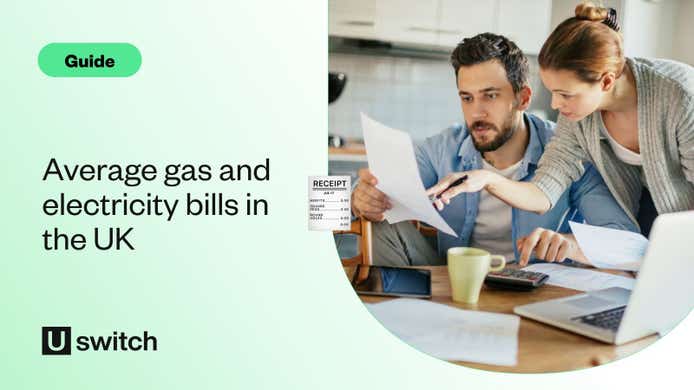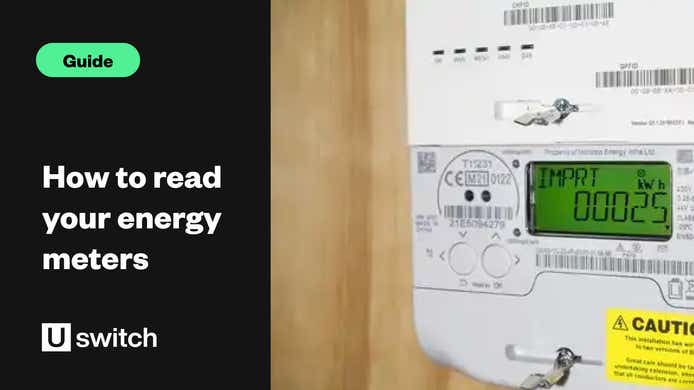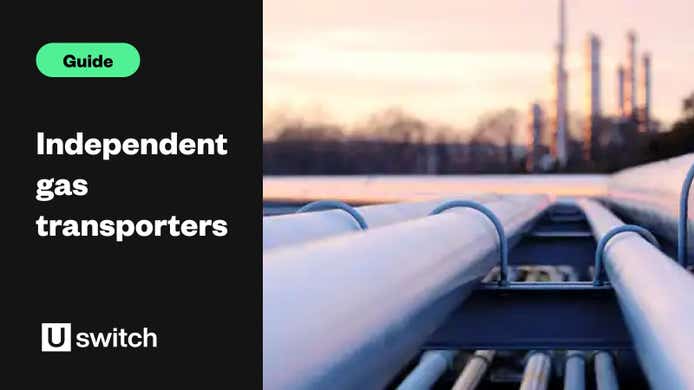Compare gas-only energy deals
Does your property only use gas? Enter your postcode below to compare gas-only deals and providers in seconds with Uswitch - get started below.

What does gas-only mean?
In the context of energy deals, "gas-only" means that you'll only compare gas-only deals - not your electricity service or a combination of your gas and electricity service (normally called a dual fuel energy deal).
Some homes get their electricity and gas from two different suppliers, which can sometimes work out cheaper.
How to compare gas prices
The price of your gas bill can depend on your usage, your area and the type of tariff you’re on – and it’s likely you could cut your heating bills by shopping around for a cheap gas supplier.
The only way to find out which supplier has the best deal for you is to compare gas prices.
- Run energy comparisons at least once a year to ensure you’re on the best deal available at the time
- To run the most accurate gas comparison, try to get an annual statement from your current supplier
- Enter your annual energy consumption in kWh so we can tell you exactly how much you can save by switching. If you don’t have an annual statement, we can still give you an accurate quote based on how much you’re spending now.
When you compare gas plans, look for different types of plans so you can look beyond only gas prices. If you’re looking for peace of mind, for instance, then a fixed plan, which guarantees your rates at a certain price for a certain period, might be a good option.
How to switch gas supplier
We're working on being able to offer gas-only deals for customers. That process of switching to a cheaper gas-only deal through Uswitch will be simple when it's available. Once you’ve used the site to compare gas suppliers, select the deal you want to switch to and we’ll do the rest.
We take care of all the paperwork for you so your switch is as stress-free as possible
- Your new cheap gas supplier will use the same meters, wires and supply lines as your old gas provider – your gas supply won’t be switched off at any point
- We contact your old gas supplier on your behalf to tell them you’re switching
- The only thing you have to do after switching is take a meter reading and submit it to both your old and new supplier. By giving a meter reading you can ensure that your bills, both your final statement and your first bill with your new supplier, are accurate and up-to-date
In the meantime, if you're looking for cheap gas and electricity, you can switch to a new dual fuel deal that uses both gas and electricity through Uswitch. Simply enter your postcode and we’ll compare cheap gas suppliers and cheap electricity suppliers for dual fuel plans.

How long does it take to switch gas supplier?
It takes just a few minutes to compare gas tariffs and select your new provider with Uswitch. After that, we’ll take care of the rest of the switching process.
It can take up to three weeks for your gas account to be transferred over to your new supplier – this includes a two-week cooling-off period in which you can cancel your switch. Most of the suppliers we work with adhere to the Energy Switch guarantee, promising to complete switches within five days. Once you’ve submitted your switch, you just need to wait to hear from your new energy supplier. Then you just need to give a meter reading to ensure you’re billed accurately.
What are the pros and cons of gas-only tariffs?
- Cheaper unit rates
Gas unit rates are less expensive than those of electricity, so a home predominantly powered by gas would currently spend less than one powered by electricity.
- Supplier flexibility
Choosing a gas-only tariff means you have flexibility in terms of choosing different suppliers for each fuel.
- Negative environmental impact
Gas isn’t environmentally friendly and it’s difficult to find suppliers offering truly green gas.
- Overall deal cost
Dual fuel deals are often cheaper than separate gas and electricity deals, so getting a gas-only deal means you could be spending more.
How to get the cheapest gas tariff for your home
Remember, the cheapest gas supplier and tariff is not the same for everyone, so compare gas deals based on your details. There are some simple things you can do to ensure you’re on the cheapest gas tariff for your home.
- Make sure you’re not on your supplier’s standard variable tariff – this is the default tariff you’ll be placed on if you haven’t switched for a while and is typically the most expensive type of plan
- When you compare gas plans, try to give accurate usage details. You can find these on your gas bill or annual statement
- If you’re on a gas-only plan but also use electricity, consider switching to a dual fuel tariff as they can be more cost-effective
- Switch gas regularly. You might not even need to change your gas supplier to save money – compare gas prices from your current supplier to see if they have a better deal.
The best way to ensure you’re not overpaying for your gas is to compare gas prices with a trusted energy price comparison site like Uswitch.
Will switching to a new gas supply affect my current supply?
No. Should you choose to switch you won’t have to endure a gas outage so don’t let this put you off your search for the cheapest gas suppliers.
When you switch your gas supplier the actual gas that is piped to your home remains the same. The only difference is how that gas is paid for, and how it’s charged.
Switching gas supply is simply a case of changing who is billing you and the rate they charge per kWh of gas used. It’s as simple as that.
In addition, gas providers sometimes offer exclusive plans and deals through Uswitch, which you can find whenever you compare the cheapest gas prices.
“With winter and higher energy usage fast approaching, it’s important to regularly compare gas tariffs and prices to ensure you’re on the best possible deal. If you’re already on a good deal, see how you can reduce your gas usage to save even more.”
| Gas costs (1 April to 30 June 2025) | |
|---|---|
| Unit rate | 6.99p per kWh |
| Standing charge | 32.67 per day |
What is the average cost of gas per kWh?
When you compare gas prices, you should see your projected annual spend. This is how much you’re estimated to spend over the next 12 months based on your usage and the price the supplier is charging per unit of gas – which is measured in kilowatt-hours or kWh.
The cost of gas per kWh will depend on how much the supplier is charging for your particular gas tariff. If you're on a fixed tariff, your gas unit rates will be fixed for the duration of your contract. However, with the vast majority of UK households on standard variable tariffs, their unit rates are capped under the energy price cap.
You can see the average gas unit rate under the current energy price cap here.
| Number of bedrooms | Gas usage (kWh) | |
|---|---|---|
| Low usage | 1-2 | 7,500 |
| Medium usage | 3-4 | 11,500 |
| High usage | 5+ | 17,000 |
How much gas does an average home use?
The bigger your home, the more gas it’s likely to use. Ofgem defines the average home as using 11,500 kWh of gas per year, though it’s unlikely that any home would use exactly that amount of gas. Ofgem’s other definitions are included in the table here.
How to reduce gas bills
You should regularly compare gas deals to ensure you’re with the cheapest gas supplier, but there are some other things you can do to keep the cost down.
You can find over 100 energy-saving tips in our comprehensive guide.
Turn down your heating
Reducing your thermostat temperature by just one degree can save you as much as £145 a year.
Upgrade your gas appliances
Older appliances like boilers are much less energy-efficient and can mean you’re spending more on gas than necessary.
Get a smart meter
If you don't already have one, getting a smart meter and connecting it to Utrack can help you uncover new ways to reduce your energy usage.
Gas-only energy FAQs
Is gas cheaper than electricity?
At the moment, gas is significantly cheaper than electricity in terms of the cost per unit (6.99p vs 27.03p). However, gas is also inefficient and bad for the environment. Additionally, gas boilers, in particular, are expensive to maintain and replace, and could be banned by the government soon anyway.
How do gas providers set prices?
Gas prices depend on a wide array of factors. These range from global production levels and changing supply chain costs to unexpected weather conditions, such as a particularly long winter. Each of these elements and many more can affect individual gas companies in different ways. In addition, gas suppliers often purchase gas months or even years in advance to mitigate potential gas price rises.
For consumers, the simplest way to ensure fair rates from a gas supplier is to frequently compare gas prices from different suppliers. The only thing that keeps the gas market competitive is the prospect of customers switching gas suppliers.
Are there any green gas suppliers?
Many suppliers claim to offer green gas, but this is usually just gas that they offset through sustainability schemes and similar initiatives. The only supplier that offers 100% green gas, which it achieves through a process called anaerobic digestion, is 100Green.
Can I switch gas supplier if I’m a renter?
Yes, you can switch gas supplier if you rent and you’re responsible for your utility bills. If your landlord is responsible for them, you won’t be able to switch (though there’s nothing to stop you from asking). Your lease should say whether it’s your responsibility to switch energy supplier.
When is the best time of year to switch gas supplier?
To make sure you’re on the cheapest gas deal, you should make a habit of switching every 12-18 months whenever your fixed energy plan is coming to an end. If you don’t switch before your fixed plan ends you’ll be rolled onto your supplier’s standard variable or default tariff, which is typically the most expensive type of plan.
In terms of the calendar year, it’s best to compare gas deals and switch around autumn, before the winter months. This can help you ensure you’re not overpaying in winter when your gas and electricity usage is likely to be higher.
You can read more about the best time to switch your energy here.
Will a cheap gas company mean worse customer service?
No. One of the misconceptions when you switch gas or electricity plans is that by going to a cheaper gas supplier you will be compromising good customer service. When you compare gas suppliers on Uswitch, your table of results allows you to click through to customer reviews and view specific supplier details.
It includes customer satisfaction ratings, so you can also compare gas suppliers in terms of customer service and not just cheaper gas prices.
You can also compare gas and electricity suppliers' performance in our annual customer satisfaction survey, with big differences between the best and worst performers every year.
Gas-only energy guides
Looking for a different type of energy?

Dual fuel energy deals

Electricity-only energy deals

Green energy deals






